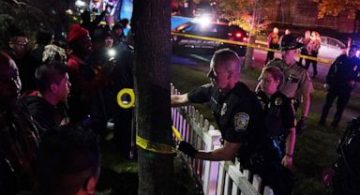
A 74-year-old man accused of shooting seven South Carolina law enforcement officers, killing one, is a Vietnam veteran and disbarred attorney who used his marksmanship to hold officers back as their comrades lay bleeding on the ground, authorities said.
Records and social media posts unearthed Thursday showed that Frederick Hopkins became serious about amateur target-shooting around the time he lost his law license in the 1980s for mishandling money.
“I just love the smell of gunpowder in the mornin’s,” he once posted on Facebook.
In recent years, Hopkins had faced several minor criminal charges, including disorderly conduct in 2014.
Hopkins is accused of opening fire Wednesday from his home in an affluent South Carolina neighborhood after deputies tried to carry out a search warrant. He also allegedly held children hostage inside, authorities said.
During the two-hour standoff, Hopkins’ gunfire prevented officers from rescuing comrades who lay bleeding on the ground, authorities said. The slain officer, a 30-year veteran, was tearfully described as the “epitome of a community police officer” by his chief.
Mourners held a candlelight vigil Thursday night for 52-year-old Officer Terrence Carraway inside a Florence church.
Two wounded city officers have been released from the hospital. A third officer was listed in serious but stable condition, the police chief said. He said he did not know the conditions of three wounded sheriff’s deputies.
It was not clear exactly how the confrontation ended. Authorities would say only that the gunman released the children as he was taken into custody, authorities said.
Hopkins was hospitalized with a head injury and unable to speak with officers, Columbia, South Carolina, television station WIS reported Thursday.
The warrant involved an accusation that a 27-year-old person at the home sexually assaulted a foster child who lives there, Florence County Chief Deputy Glenn Kirby said.
In 2016, Hopkins posted photos on Facebook of guns set up for target practice, bragging that he was the state’s 2011 “3-Gun Silhouette Champion.” In a 2014 post, he said he celebrated his 70th birthday at a range by repeatedly firing his M14 rifle, which he “set up exactly like the one I used in Vietnam.”
His competitive shooting would have begun around the time he lost his law license over $18,000 in wrongfully collected attorney fees. A court order shows that the state Supreme Court in 1984 allowed Hopkins to pay back the debt over time and surrender his license rather than complete a six-month jail term.
Court documents also show that he was injured in Vietnam and received disability payments. The filing does not elaborate on the injury.
During the standoff, the sheriff’s armored personnel carrier was brought in to recover the wounded.
“Fire was being shot all over. The way this suspect was positioned, his view of fire was several hundred yards. So he had an advantage,” Florence County Sheriff Kenney Boone told reporters.
Florence Police Chief Allen Heidler estimated Thursday that it took a half-hour to reach some of the wounded officers.
The slain officer was just shy of 31 years of service with the Florence Police Department.
Heidler described Carraway as the “epitome of a community police officer” and a guy who “laughed all the time.”
Carraway “was a giant of a man, but he was the proverbial gentle giant, and I loved him,” the police chief said.
Authorities did not identify any of the wounded officers.
The violence stunned the area, where many people have been dealing with the aftermath of Hurricane Florence.
Florence, a city of 37,000 in South Carolina’s northeastern corner, sits at the convergence of Interstates 95 and 20 northwest of the state’s well-known “Grand Strand” of beaches.
Byron Black, who lives near the subdivision where the shooting happened, said he knew both the slain officer and the children of the suspect and described the Hopkins family as “good people.”
“You never know how stuff will happen,” he said.
He said Carraway, his youth football coach in the late 1990s, was a down-to-earth community leader with whom young people felt comfortable discussing their problems.
“If you got in trouble, he would try his best to get you out of it or tell you the steps you need to take to get out of it,” he said, later adding: “He was one of the good cops.”
More than a dozen relatives and friends of Carraway sat in his Darlington home Thursday afternoon, quietly sitting on couches as news coverage of the shooting played on a TV.
They respectfully declined to talk to a reporter.
So many people came to Carraway’s rural house across from a soybean field that they were parking in an empty lot next door.
A sign on the door asked visitors to leave by 6 p.m. so the family could rest.
———
Kinnard reported from Columbia, South Carolina. Associated Press researcher Monica Mathur in New York contributed to this report.





